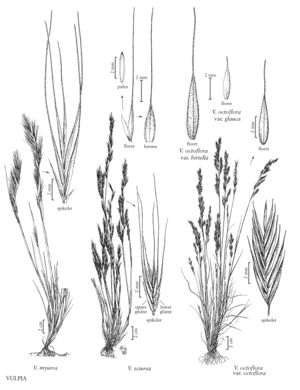Difference between revisions of "Vulpia sciurea"
FNA>Volume Importer |
FNA>Volume Importer |
||
| Line 8: | Line 8: | ||
|name=Vulpia elliotea | |name=Vulpia elliotea | ||
|authority=unknown | |authority=unknown | ||
| − | }}{{Treatment/ID/Synonym | + | }} {{Treatment/ID/Synonym |
|name=Festuca sciurea | |name=Festuca sciurea | ||
|authority=unknown | |authority=unknown | ||
| Line 22: | Line 22: | ||
-->{{Treatment/Body | -->{{Treatment/Body | ||
| − | |discussion=<p>Vulpia sciurea, our most distinctive native species, is restricted to the Flora region. It can be recognized by its small spikelets and apically pubescent lemmas, and grows mostly in deep, sandy soils of open woodlands, old fields, roadside ditches, and sand hills in the southeastern Flora region. It is listed as endangered in New Jersey.</p> | + | |discussion=<p><i>Vulpia sciurea</i>, our most distinctive native species, is restricted to the Flora region. It can be recognized by its small spikelets and apically pubescent lemmas, and grows mostly in deep, sandy soils of open woodlands, old fields, roadside ditches, and sand hills in the southeastern Flora region. It is listed as endangered in New Jersey.</p> |
|tables= | |tables= | ||
|references= | |references= | ||
| Line 42: | Line 42: | ||
|publication year= | |publication year= | ||
|special status= | |special status= | ||
| − | |source xml=https://jpend@bitbucket.org/aafc-mbb/fna-data-curation.git/src/ | + | |source xml=https://jpend@bitbucket.org/aafc-mbb/fna-data-curation.git/src/8f726806613d60c220dc4493de13607dd3150896/coarse_grained_fna_xml/V24/V24_639.xml |
|subfamily=Poaceae subfam. Pooideae | |subfamily=Poaceae subfam. Pooideae | ||
|tribe=Poaceae tribe Poeae | |tribe=Poaceae tribe Poeae | ||
Revision as of 17:21, 18 September 2019
Culms 15-50(60) cm, solitary or tufted, erect or drooping at maturity. Sheaths glabrous; ligules 0.5-1 mm; blades usually shorter than 10 cm, 0.5-1 mm wide, flat or rolled, glabrous. Panicles 5-20 cm long, 0.5-1 cm wide, with 1-2 branches per node; branches appressed to erect. Spikelets 3.5-5.2 mm, with 3-6 florets; rachilla internodes 0.25-0.9 mm. Lower glumes 1.5-2.5 mm, about 2/3 the length of the upper glumes; upper glumes 2.5-4 mm; lemmas 2.5-3.5 mm, 3-veined, evidently pubescent distally, glabrous or sparsely pubescent proximally, awns 4.5-10 mm; paleas subequal or equal to the lemmas; anthers about 0.5 mm. Caryopses 1.5-2.5 mm. 2n = 42.
Discussion
Vulpia sciurea, our most distinctive native species, is restricted to the Flora region. It can be recognized by its small spikelets and apically pubescent lemmas, and grows mostly in deep, sandy soils of open woodlands, old fields, roadside ditches, and sand hills in the southeastern Flora region. It is listed as endangered in New Jersey.
Selected References
None.
